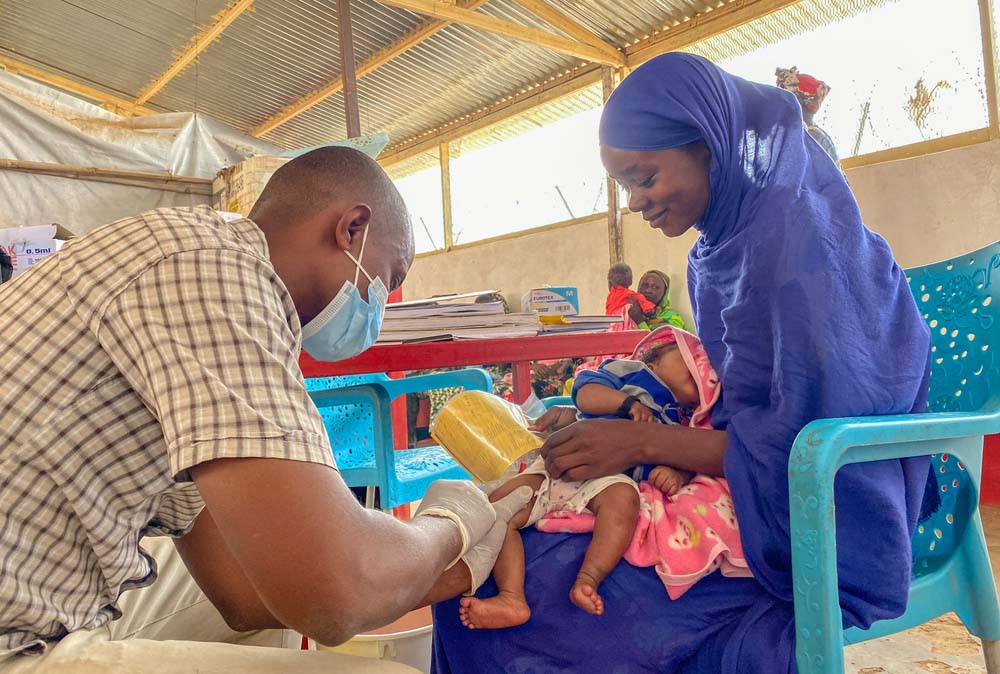Measles spreading in Sudan, rabies in South Kordofan

MSF provides vaccination to a child in East Darfur (File photo: MSF)
At least 27 children are infected by measles in the camps for the displaced in Delling in South Kordofan. Cases of rabies were also recorded. In Buram in South Darfur, measles is also spreading, in addition to watery diarrhoea among children. Medics report a dire scarcity of medicines, nutrition, and medical equipment.
Noura Faroug, director of Health Services of Delling, reported that at least 27 children were found infected with measles* among the displaced people in the town. 19 people in the town are suffering from rabies**. In a meeting of the Delling locality Crisis Management Committee on Sunday, she warned of the danger of the situation in the region because of “the acute shortage of medicines, vaccines, and other medical aids”.
The chair of the committee, Abdelrahman Johar, referred to “the terrible deterioration in the health situation in Delling town”. The director of Delling Hospital renewed her urgent appeal “to all parties” to provide anaesthesia, noting that “it was not possible to save the lives of many patients due to the current complete lack of anaesthesia in hospitals”.
Ibrahim Abdallah, director of the locality, instructed a follow up on the interruptions in the flow of the power provision. The meeting also discussed the soaring sorghum prices. Abdallah called on traders to take into account the current conditions and limit the rise in prices.
Delling is hosting thousands of displaced from other parts of the locality, neighbouring Habila, and from West Kordofan.
Buram
In Buram in South Darfur measles cases were also reported, in addition to an increasing prevalence of watery diarrhoea among children.
Immunisation operations have stopped since the outbreak of the war, Bashar Sakin, medical director of the Royal Buram Hospital told Radio Dabanga yesterday. “The lack of vaccines could lead to the rapid spread of measles and other viral diseases that could threaten the lives of many children.”
The hospital recorded ten cases of watery diarrhoea over the past few days. Most cases have responded to treatment while the rest are undergoing another treatment plan.
As for shortages, the hospital of Buram suffers from a lack of nutrition, “especially dairy and biscuits”, and of medicines and medical equipment. “The hospital has only beds and a doctor’s office, which contains a stethoscope and a pressure measuring device. We lack power provision, and we do not have solar panels. The generator works for an hour or two a day due to the scarcity of fuel.”
The Ministry of Health, in cooperation with the World Health Organisation (WHO), last year carried out a measles rubella vaccination campaign that included seven states controlled by the army in eastern and northern Sudan, and the Blue Nile and White Nile regions, targeting more than five million children. Darfur, Kordofan, Khartoum, and El Gezira did not witness any immunisation campaign.
Last week, health authorities in Central Darfur sounded the alarm over the perilous circumstances faced by children and expectant mothers due to severe shortages in vaccines.
Médecins Sans Frontières (MSF) reported a rise of suspected cases of measles and malnutrition among children in Sudan in August last year. MSF was providing routine immunisation services to 30 to 40 children in White Nile state each day but said a mass vaccination campaign was needed. In September, the UN High Commissioner for Refugees (UNHCR) sounded the alarm on a measles outbreak in White Nile state.
* Measles is a highly contagious disease caused by a virus. It spreads easily when an infected person breathes, coughs or sneezes. It can cause severe disease, complications, and even death, the World Health Organisation (WHO) writes on its website. The disease can affect anyone but is most common in children. It infects the respiratory tract and then spreads throughout the body. Symptoms include a high fever, cough, runny nose, and a rash all over the body. Being vaccinated is the best way to prevent getting sick with measles or spreading it to other people. The vaccine is safe and helps your body fight off the virus.
Yet, in particular due to the COVID-19 epidemic that broke out four years ago, measles is making an alarming global resurgence. About 61 million doses of measles-containing vaccine were postponed or missed from 2020 to 2022 due to COVID-19 related delays in immunisation, which increases the risk of bigger outbreaks around the world. Moreover, fears for the COVID-19 vaccination has also led to an increased fear for vaccinations in general. The WHO and US Centers for Disease Control issued a warning about an uptick in global cases in November last year after cases rose 18 per cent from 2021 to 2022. Forbes reported yesterday that the measles outbreak in the USA this year so far already equals last year’s total.
** Rabies is a vaccine-preventable viral disease which occurs in more than 150 countries and territories. It causes tens of thousands of deaths every year, mainly in Asia and Africa, 40% of whom are children under 15 years of age. Dogs are the main source of human rabies deaths, contributing up to 99 per cent of all rabies transmissions to humans. Rabies can be prevented through vaccination of dogs and prevention of dog bites.











 and then
and then